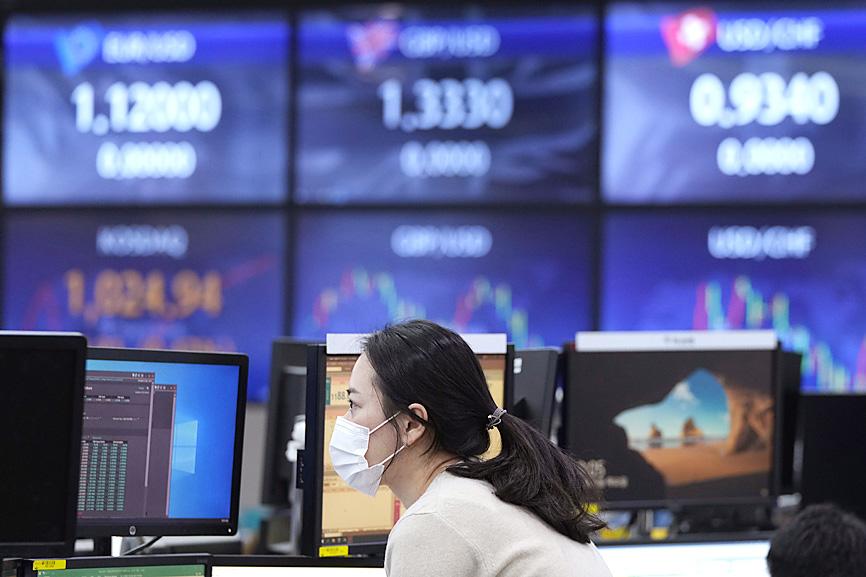Bank of Korea (BOK) Governor Lee Ju-yeol yesterday said interest rates are still accommodative after two hikes since August, suggesting further tightening is in the pipeline as inflation risks mount in the recovering economy.
The board considered the price pressures building in the economy and financial imbalances when it decided to raise rates by 25 basis points to 1 percent, Lee told a press briefing.
The central bank revised up its inflation outlook to 2.3 percent for this year and 2 percent for next year, expecting price gains would exceed, or at least hover around, its target through next year.

Photo: AP
It also forecast GDP unchanged at 4 percent growth for this year and 3 percent for next year.
“With this hike, the policy rate is still below the neutral level, the real rate is still negative, and there’s plenty of liquidity,” Lee said. “It’s natural that we normalize the rate, which has been excessively low, as the economy recovers.”
Bond yields fell and futures rose following the decision, as the governor failed to commit to a firm date for the next hike.
One of the central bank’s seven policy members dissented from the decision and called for rates to remain unchanged, largely in line with market expectations of the likely voting pattern.
“Concerns that this meeting will be a hawkish hike seems to have eased, as Lee said the timing of the next rate increase will depend on the economy and didn’t specify a timing,” Shinyoung Securities Co fixed-income strategist Cho Yong-gu said.
Central banks worldwide are grappling with price pressures that threaten to destabilize their economies’ recovery from the COVID-19 pandemic.
New Zealand on Wednesday signaled aggressive tightening ahead after hiking for the second time in two months, while surging US prices are pressuring the US Federal Reserve to pivot more quickly to tightening.
Lee referred to global supply bottlenecks and rising inflation expectations among the public as factors that could fuel further price gains in the economy.
The Fed’s policy moves will be an important consideration for the BOK, but domestic conditions will take priority, he said.
However, adding to uncertainty is South Korea’s COVID-19 situation: The number of daily cases reached a new record this month, as the government loosened restrictions.
In addition, while exports have so far benefited from a pandemic-era boom in tech demand, a normalization of that trend could see trade become less of a support to growth.
Lee now has two more decisions before he steps down in March next year.

Taiwan would remain in the same international network for carrying out cross-border payments and would not be marginalized on the world stage, despite jostling among international powers, central bank Governor Yang Chin-long (楊金龍) said yesterday. Yang made the remarks during a speech at an annual event organized by Financial Information Service Co (財金資訊), which oversees Taiwan’s banking, payment and settlement systems. “The US dollar will remain the world’s major cross-border payment tool, given its high liquidity, legality and safe-haven status,” Yang said. Russia is pushing for a new cross-border payment system and highlighted the issue during a BRICS summit in October. The existing system

Taiwan Semiconductor Manufacturing Co (TSMC, 台積電) is expected to grow its revenue by about 25 percent to a new record high next year, driven by robust demand for advanced technologies used in artificial intelligence (AI) applications and crypto mining, International Data Corp (IDC) said yesterday. That would see TSMC secure a 67 percent share of the world’s foundry market next year, from 64 percent this year, IDC senior semiconductor research manager Galen Zeng (曾冠瑋) predicted. In the broader foundry definition, TSMC would see its market share rise to 36 percent next year from 33 percent this year, he said. To address concerns

Intel Corp chief financial officer Dave Zinsner said that a formal separation of the company’s factory and product development divisions is an open question that would be decided by the chipmaker’s next leader. Zinsner, who is serving as interim co-CEO following this month’s ouster of Pat Gelsinger, made the remarks on Thursday at the Barclays technology conference in San Francisco alongside co-CEO Michelle Johnston Holthaus. Intel’s struggles to keep pace with rivals — along with its deteriorating financial condition — have spurred speculation that the next CEO would make dramatic changes. That has included talk of a split of the company’s manufacturing

PROTECTIONISM: The tariffs would go into effect on Jan. 1 and are meant to protect the US’ clean energy sector from unfair Chinese practices, the US trade chief said US President Joe Biden’s administration plans to raise tariffs on solar wafers, polysilicon and some tungsten products from China to protect US clean energy businesses. The notice from the Office of US Trade Representative (USTR) said tariffs on Chinese-made solar wafers and polysilicon would rise to 50 percent from 25 percent and duties on certain tungsten products would increase from zero to 25 percent, effective on Jan. 1, following a review of Chinese trade practices under Section 301 of the US Trade Act of 1974. The decision followed a public comment period after the USTR said in September that it was considering